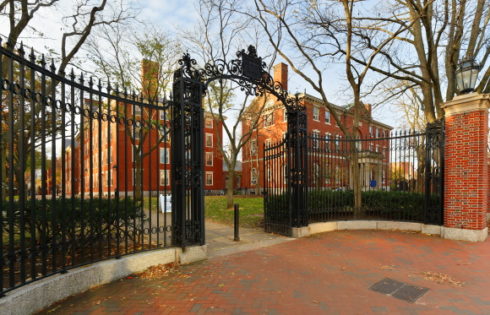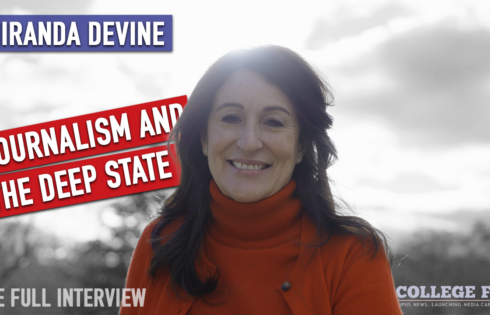
Questions arose after U. Wisconsin students received emails from the Kamala Harris campaign in the fall
The College Fix recently obtained more than 60,000 college students’ contact information from two public Wisconsin universities through public records requests.
All The Fix had to do was ask, and within two hours of the request, the University of Wisconsin’s Madison and Whitewater campuses sent massive spreadsheets via email.
The documents included students’ names, addresses, university emails, majors, and, in some cases, their personal phone numbers.
The Fix sought the documents after students raised questions about campaign messages supporting Kamala Harris that appeared to be sent campus-wide in October.
“How did they get my email?” one student, a senior who planned to vote for Donald Trump, told The Fix at the time. Similar questions arose when Harris’s campaign texted 70,000 Arizona State University students earlier in the fall.
“No one who submitted a student directory data request in 2023 or 2024 (to-date) identified themself as being directly affiliated with the campaign of Vice President Kamala Harris or any other national political figure,” Greg Bump, a spokesperson from UW-Madison, told The Fix.
However, he also said they would not be required to identify themselves as such.
“Requesters of student directory information are required to provide a name, phone number, and email address. They are not required to identify an organization to which they may belong or state the reason they are requesting this data,” Bump said in a recent email.
The Harris-Walz campaign sent mass emails to UW-Madison and UW-Whitewater students in October ahead of the presidential election, The Fix reported. The messages advertised a concert and rally at the Madison campus as well as a visit by former President Barack Obama.
MORE: ASU under fire after Harris campaign texts 70,000 students
David Cuillier, director of the Joseph L. Brechner Freedom of Information Project at the University of Florida, told The Fix that directory information, in general, is public under the federal Family Educational Rights and Privacy Act.
“When looking at it from the legal perspective and common practice across the nation, having your name out there is generally not considered an invasion of privacy,” he said via email.
“To be an invasion of privacy, the information release has to be truly embarrassing and have no legitimate public purpose,” he said.
Cuillier said he believes people should have access to such information.
“There is a purpose for people to have basic directory information, including one’s constitutional right to receive information. We shouldn’t take away people’s fundamental American right to get information that might actually end up helping them,” he said.
“If someone is really concerned about people knowing that basic directory information, then they can simply ask the university to keep their information private,” he told The Fix.
A small portion of students on UW-Whitewater’s list were listed as “high school,” and appear to be taking classes through the early college credit program.
When asked about minor students’ safety, Cuillier told The Fix that the “directory information part of FERPA applies to K-12, as well.”
“If parents want to have that information kept secret for their minors, they can ask the university to do so, as well as their school district,” he said.
Bump at UW-Madison told The Fix the university complies with federal law and the Wisconsin Public Records Law governing student directory information.
As part of UW-Madison’s orientation program, “students are informed of these laws and their ability to restrict some or all their directory information from being released,” he said.
He said 2,169 of the 52,328 students enrolled for the fall 2024 term “elected to restrict the release of some or all of their directory information.”
Bump added that the Office of the Registrar handles requests for student directory data, and they had received 470 requests in 2024 as of Dec. 18.
“Of those requests for which submitters did provide an affiliated organization, a significant portion came from individuals affiliated with the university (students, departments, etc.), student organizations, and local businesses that market to students (including property management companies),” he told The Fix.
The U.S. Department of Education’s Protecting Student Privacy website states that “FERPA defines directory information as information contained in an education record of a student that would not generally be considered harmful or an invasion of privacy if disclosed.”
A school “may disclose ‘directory information’ to third parties without consent” if it has publicly defined what it considers directory information, parents’ and students’ right to opt out of the disclosure of directory information, and the time period by which parents or students must opt out, according to the department.
The Fix also reached out to UW-Whitewater, the U.S. Department of Education, the Badger Institute, and the Wisconsin Department of Public Institution by email for comments on the availability of students’ contact information, but none of them replied.
The Fix additionally contacted Wisconsin State Assembly Speaker Robin Vos’ office twice by email within the past two weeks. When contacted by phone this week, his office said he was unavailable for comment.
MORE: Students’ private FERPA data given to third-party voting firm
IMAGE: Youngryand/Shutterstock
Like The College Fix on Facebook / Follow us on Twitter






Please join the conversation about our stories on Facebook, Twitter, Instagram, Reddit, MeWe, Rumble, Gab, Minds and Gettr.